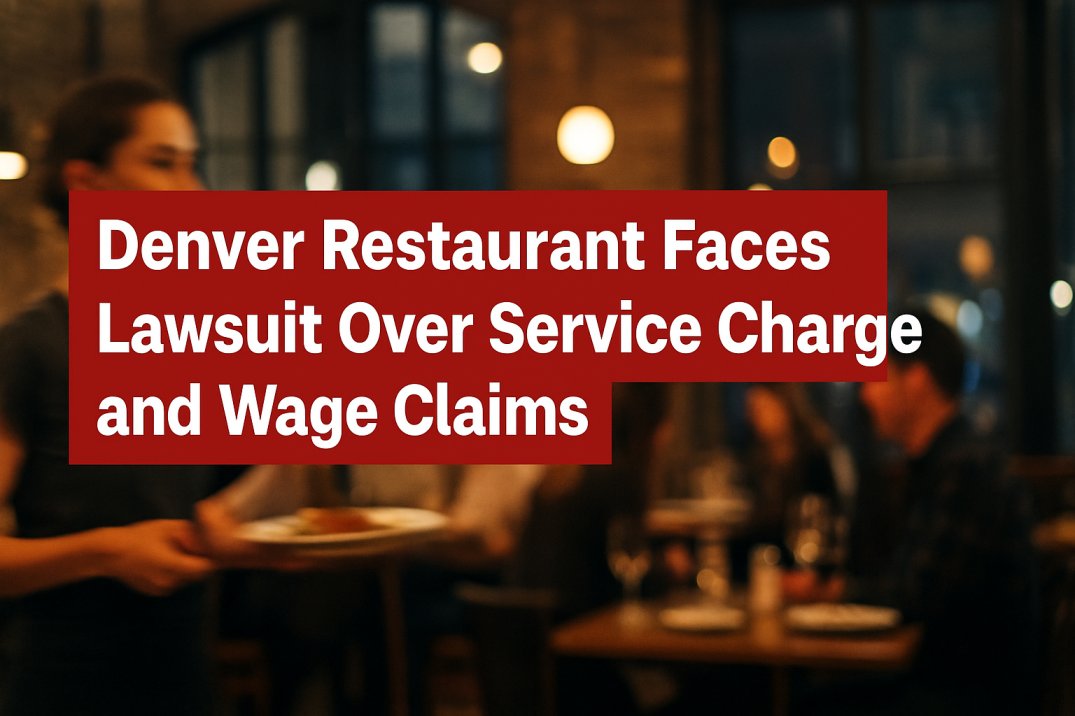DENVER — A leading restaurant group in Denver now faces a lawsuit. Former employees say the company broke state labor laws. They also claim that it misuses service charges taken from customer bills. Three women filed the lawsuit in January 2025. Each woman worked at a different restaurant run by Culinary Creative Group (CCG). This company manages several high-profile spots across Denver. Its portfolio includes Kumoya, a modern Japanese eatery. It also owns Fox and the Hen, a trendy brunch destination. Another name on the list is Tap & Burger, known for upscale takes on American classics. These locations are not casual diners. These restaurants offer crafted menus and modern interiors, drawing customers who expect high-quality food and polished service. Their prices reflect that image.
Each of these restaurants adds a 20% service charge to every bill. Customers do not choose to pay it. It appears automatically. The company says the charge supports the team. Customers assume it replaces a tip. Staff members say they believed the same. But the lawsuit tells a different story. The plaintiffs claim that only part of the money reached employees. They say a significant portion went to restaurant managers. That breaks trust between diners and staff. It also raises legal issues. In Colorado, tips belong to workers. Service charges do not. Businesses cannot use that fee to lower wages unless they follow strict rules.
The case has gained public interest across Denver. It forces questions about fairness and pay in the service industry. Many workers in restaurants depend on tips to make a living. When businesses add a fixed charge, they must explain where the money goes. This lawsuit demands clarity. Legal experts say the case could reshape restaurant policies. It may lead to new laws or enforcement actions. The outcome could set a model for how other states handle service charges. It may also force restaurant owners to rethink how they structure pay for their teams.
Workers Say Service Fees Did Not Reach Them
The former employees say the company did not follow through on its promises. They claim the 20% service charge listed on each customer’s bill did not make it into their pay. They believed that the fee worked like a tip. Customers assumed the same. According to the lawsuit, that assumption was false. A large share of the fee went to management. The plaintiffs say as much as 30% of the charge ended up with supervisors. That left hourly workers with less than they expected. The plaintiffs say the company never gave them a clear breakdown. They had no way to track the money.
Marianna White worked at Kumoya. She says leadership told her she would make between $35 and $50 per hour. Her pay never matched that range. She says she earned under $25 per hour, even during peak weeks. She points out that strong sales did not raise her earnings. Some weeks, she made under $1,000, despite handling large tables and long shifts.
Faith Lindstrom and Hailey Jamieson worked at Fox and the Hen. They spent several months at the restaurant. Both say they had no insight into how the service charges were used. They asked their managers for answers. The response confirmed their doubts. Managers admitted that some of the money went to leadership. That created more frustration and mistrust. All three say the system lacked transparency. They believed the charge would boost their income, but their pay remained low. That gap between promise and reality now forms the basis of their claim. They argue the company misled both workers and customers.
The Company Says It Followed the Law
Culinary Creative Group denies the claims made in the lawsuit. The company says its pay system follows Colorado labor laws. Leaders argue that the service charge was never meant to act as a tip. They say it helps balance pay across the team. Juan Padro, the CEO, says the charge benefits more than just servers. He says kitchen staff and dishwashers play an essential role. They do not receive tips from guests. He believes the service charge gives them fair support.
According to Padro, the model promotes unity and reduces pay gaps inside the restaurants. The lawsuit says 30% of the service charge went to managers. The company disagrees. CCG claims the real number is closer to 10%. They say most of the money went to hourly workers. They have not provided pay records or a full breakdown.
CCG has also stayed quiet about any changes made since the case began. Company leaders continue to defend the policy. They say it ensures fairness across roles. They reject the idea that it harms employees. Padro says the company built the system to reward all parts of the team. He describes it as a way to fix long-standing issues in restaurant pay. He has not responded directly to the workers’ pay claims. The lawsuit continues as both sides stand firm.
Lawsuit Points to Multiple Violations
The legal complaint outlines several violations under Colorado wage and labor laws. The workers claim the company crossed legal lines in more than one area. They argue that the service charge policy created confusion. They also say the pay structure broke key rules. Under Colorado law, tips and service charges are not the same. Tips go directly to employees. Service charges go to the business. That legal difference matters. If a restaurant collects a service fee, it must follow strict rules. It cannot treat the charge like a tip unless state law allows it.
The lawsuit says Culinary Creative Group ignored that rule. It claims the company used the service charge to lower base wages. The plaintiffs say CCG paid some staff the tipped minimum wage, which is legal only if workers actually receive tips. Since the service charge does not qualify, the pay rate may not be valid. That raises serious legal questions. If proven, it means the company may have underpaid staff for months or even years. It could owe back pay. It could also face penalties from the state labor department.
The complaint also focuses on rest break violations. Colorado requires employers to give paid 10-minute breaks during long shifts. These breaks are not optional. The law protects workers from burnout and fatigue. The plaintiffs say they went full shifts without breaks. Some say they worked all day without sitting down. If that claim holds up, it could lead to additional penalties. It could also signal a broader pattern of noncompliance inside the company. Together, these issues paint a picture of a workplace that may have failed to follow labor rules. The lawsuit now pushes state regulators and the courts to take a closer look.
Legal Experts Say the Case Could Set a Standard
Legal professionals believe this case could reshape pay practices in the restaurant industry. Adam Harrison, the attorney representing the former employees, says the lawsuit touches a core issue. He says businesses must be honest about how they use customer fees. According to him, service charges should never replace fair wages. Harrison says employers often create policies that confuse workers and mislead guests. He argues that state law leaves no room for vague pay structures. “Companies can’t hide wage cuts behind unclear fees,” Harrison says. “The law demands transparency at every step.” Other legal experts agree. They say courts in Colorado have not yet ruled clearly on cases like this. A strong decision could set a new precedent. It could force restaurants to explain service charges in detail. It could also lead to changes in how wage laws apply across different types of staff.
The case has already gained attention outside Denver. Legal observers say other restaurant groups are watching closely. A ruling against CCG may lead to more lawsuits across the state. Businesses that use service fees may now face audits, legal reviews, or public backlash. If the court finds that CCG broke the law, restaurants may need to revise how they handle service charges. Some may return to traditional tipping. Others may adjust wages to avoid risk. The case could become a turning point in how restaurants manage staff pay in Colorado and beyond.
Restaurant Industry Faces Bigger Questions
Many restaurants now rely on service charges instead of traditional tips. Owners say this system creates balance. They say it helps support kitchen staff, not just servers. Some believe it brings fairness to a team that often earns uneven pay. But not all service charge models follow clear rules. Some restaurants fail to explain how these charges work. Others apply them without sharing how the money gets divided. This creates confusion. It also breaks trust.
Workers deserve to know how they get paid. Customers deserve to know where their money goes. When businesses blur the lines, problems start. This lawsuit shows how fast those problems can grow. The case highlights a deeper challenge. The restaurant industry faces pressure to change. Wages, benefits, and fairness now drive the conversation. Business owners must update old systems. They must match legal standards and public expectations.
A strong pay policy needs three things. A strong pay policy must follow the law, remain fair to all workers, and be clear in how it operates. Companies that miss any of these may face lawsuits or public backlash. This lawsuit is not just about one restaurant group. It reflects a larger issue in the industry. Service charges are growing. So are the questions around them. The outcome of this case may push others to review their pay structures and adjust before courts force their hand.
Disclaimer: This article shares public information on the “Denver Restaurant Faces Lawsuit” and does not offer legal advice or promote any legal service. If you have any questions about this, please don’t hesitate to contact us.
Muhammad Suleman Ahmad is a content writer covering lawsuits, legal explainers, and court-related topics for LawsuitDeck.com. His work is structured for clarity and general understanding.


